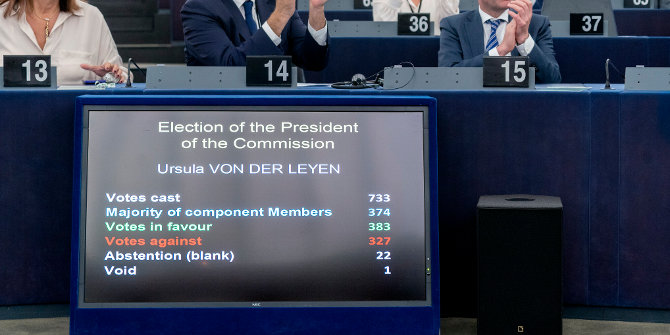Can EU funding increase local state capacity? Paweł Charasz and Jan P. Vogler present results from a randomised survey of more than 2,400 municipal administrations in Poland. They find that local governments that have strongly benefited from EU funding exhibit more efficient internal administrative decision-making.
When the Soviet Empire disintegrated, a challenge of monumental proportions awaited European politicians and societies. The former communist countries of Central and Eastern Europe were at the cusp of gaining freedom, but their future was marked by a fundamental uncertainty: would they transform into resilient democracies with robust market economies, or were they doomed to experience lasting political and economic turmoil?
The many legacies of communism made the second scenario a real possibility. Among others, the Eastern Bloc’s communist parties had sought to centralise and monopolise all political power. Fearing the possibility of local dissent, they had stripped local institutions from as many responsibilities as possible. For example, in Poland, local self-government had been abandoned as early as 1950 and replaced by a system of councils that were directly subordinated to central party institutions. What was left were poorly run, powerless, and corrupt administrative bodies that merely executed the will of central elites and that had little prowess in the actual task of governing.
From the perspective of democratic development, this posed a serious problem. True democracy can only thrive when local communities have a say in making and implementing decisions that affect their well-being. Accordingly, the idea of participative local government with strong underlying administrative institutions has historically had an enormous impact on the long-term success of democracy. But how should the local administrations of post-communist Europe catch up in this area? And what role did the EU play in promoting the development of local state capacity?
EU structural funds and local state capacity
In a recent study, we argue that the development of local state capacity — that is so central to the process of democratisation — was an important by-product of massive transfer payments made through the EU’s structural funds. While the funds were primarily created to remove socioeconomic disparities between European regions, they also had a wide-ranging political-administrative impact.
How did these funds affect state capacity? The EU makes vast pools of funding specifically available for local governments to solicit. This has also been true for local governments in Poland for many years now. They have the opportunity to submit funding proposals in a variety of substantive areas, including support for transportation infrastructure, environmental protection, education and healthcare, and more.
Irrespective of substantive area, local administrations need to create an application that meets a series of complex technical conditions. Subsequently, these proposals are not only evaluated against a benchmark, but are also compared to each other on a competitive basis. Given these circumstances, local governments need to exert real effort to obtain funding, and — once it is granted — building further bureaucratic capacity for implementation often becomes a necessity as well.
Many years of EU funding have already had multi-faceted consequences for overall state capacity in Poland. While it is likely that newly created capacity is initially used for the specific purpose of attracting and administering EU funding only, bureaucracies of all kinds are well-known for finding new justifications for their existence once their original mission is fulfilled. Given the severe historical underdevelopment of local state capacity that resulted from decades of communist rule, such new purposes were plentiful in Poland and other Eastern European countries. Therefore, we argue that the added capacity eventually spilled over into other areas of the local administration that were not concerned with attracting or managing EU funding.
Testing the argument
In order to test our argument that EU funding led to overall state capacity improvements, we sent inquiries to more than 2,400 local governments in Poland. These inquiries included a survey with numerous questions that required local administrations to mobilise administrative resources. Our goal was to find out if municipalities that attracted more EU funding showed improved capacity in two specific areas.
First, we were interested in whether they would reply more quickly and comprehensively in general, which would be indicative of greater local state capacity. Additionally, we were interested in whether they would show diverging response behaviour to substantively different inquiries depending on variations in their perceived importance or legitimacy. Since municipalities receive a large variety of different inquiries and not all of them are equally important, discrimination between fundamentally dissimilar inquiries reveals the efficient internal allocation of administrative resources.
To reveal the existence of discrimination capacity, we created two types of inquiries and we randomly assigned one of them to each local government. The inquiries were substantially different in their stated goal and appearance, even though the underlying attached survey was identical. One was an “academic inquiry,” the other one was a “business inquiry.” In the former, we emphasised the contribution that local administrations would make to our research study. In the latter, while we also briefly mentioned our study, we put significantly more emphasis on a business portal that we had specifically created for our inquiry named ‘Invest-In-Poland-Now’.
While the business portal looks convincing at first glance, it is not a known or reputable entity. Moreover, the stated purpose of attracting investors to Poland was visibly inconsistent with our backgrounds as researchers. Accordingly, once local administrations did a little bit of research — which is possible with greater state capacity — the business inquiry’s legitimacy could easily be called into question and responding to it become less expedient.
In line with our expectations, we found a clear relationship between the amount of EU funding local administrations had received and their response behaviour toward these two fundamentally different inquiries. While local governments with little EU funding did not effectively differentiate between the two inquiries (resulting in similar amounts of administrative resources used to respond to both), local governments that had massively profited from EU funding in the past were able to clearly and effectively distinguish between them.
They replied significantly more often, faster, and more comprehensively to our academic inquiry that had a noticeably higher level of internal consistency and credibility. At the same time, we did not find that EU funding affected differences in overall responsiveness, suggesting that instead of devoting more bureaucratic resources to particular tasks, high-capacity bureaucracies utilise existing resources more efficiently (which manifests itself in the observed discriminatory patterns).
All in all, this means that local governments that strongly benefited from EU funding were able to distinguish between two fundamentally different inquiries more effectively, showing increased state capacity through the improved efficiency of internal administrative decision making. While we tested improvements in state capacity in these very specific areas, our findings are indicative of overall improvements in local government efficiency, which likely also benefit other areas of local governance. This points to an important role of EU structural funds in increasing local state capacity — a key aspect of Central and Eastern Europe’s multi-faceted democratisation process.
For more information, see the authors’ accompanying paper in European Union Politics
Note: This article gives the views of the authors, not the position of EUROPP – European Politics and Policy or the London School of Economics. Featured image credit: European Council





